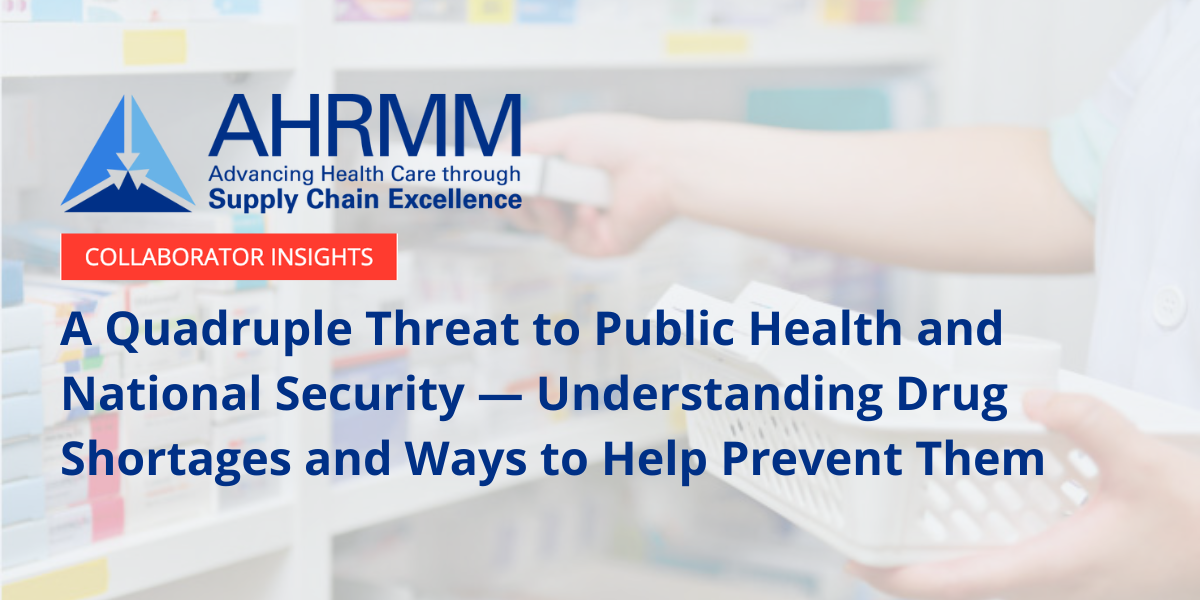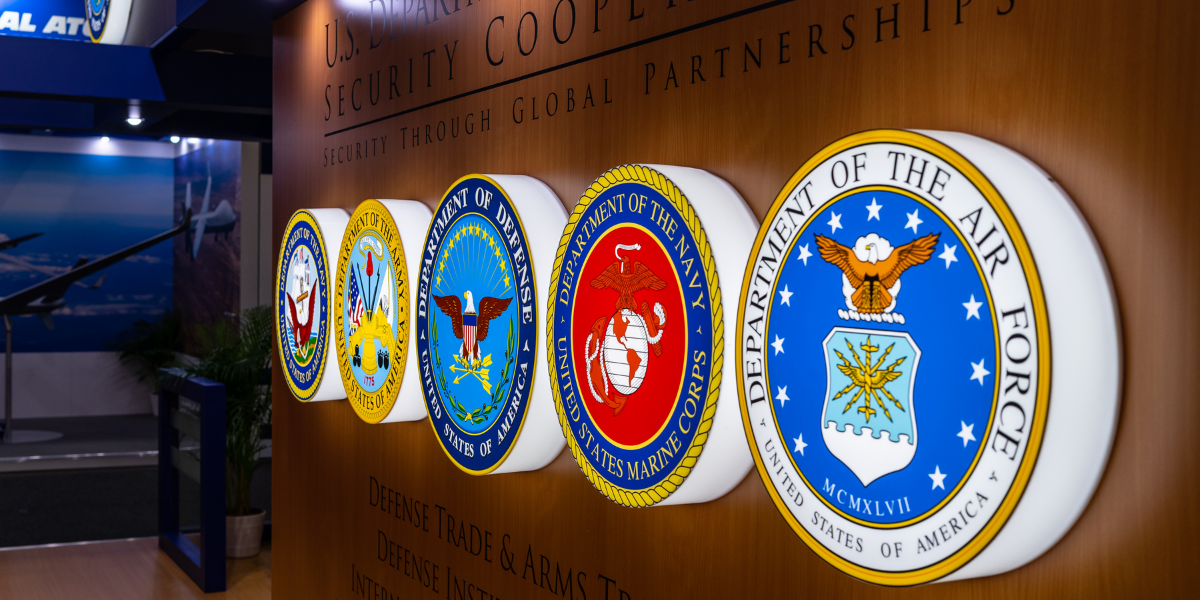AHRMM24 DoD-led Pharmaceutical Quality Assessment
DoD-led Pharmaceutical Quality Assessment: Pilot Study Results and Applications for Health Systems
Valisure is currently working with the Uniformed Services University for Health Sciences (USUHS) and the Department of Defense (DoD) on a Pharmaceutical Quality Risk Assessment Pilot Study. The study aims to evaluate essential medicines from various suppliers and assign each a quality risk score. This study is largely based on a Cooperative Research and Development Agreement (CRADA) established last year to produce objective drug quality data through independent sourcing and chemical testing. Below is a summary of the study’s background, objectives, and key resources are linked below.
According to FY23 National Defense Authorization Act (NDAA) Section 860, paragraph (b): the DoD shall “establish a working group” to “assess risks to the Department’s pharmaceutical supply chain.” Defense Department leadership has determined that the working group shall perform a logistical risk assessment and a quality risk assessment. Some logistical Information may be produced through the operation of this study; however, the primary purpose of this Research Project is to assess quality. Quality will be assessed by independently testing the chemical properties of samples of drug products from suppliers to the Department of Defense and objectively scoring the respective National Drug Codes (NDC) of each supplier according to a recently published paper authored by a consortium of healthcare key opinion leaders. Scoring NDCs will not only provide a quality risk assessment but do so in a manner that is actionable for both pharmaceutical distribution at contracting.
Over the past few decades, production of most of America’s generic drugs and particularly, the ingredients needed to make them, has moved to India and China where regulation is increasingly difficult. There is growing concern over drug quality and safety, as evidenced by rampant drug shortages, approximately 76% of which are due to manufacturer quality problems, roughly 3 drug recalls per day in the U.S., often related to dangerous impurities, and a growing number of studies and physician reports of patient harm. To address such issues, the Administration for Strategic Preparedness & Response (ASPR) published the report “Essential Medicines and Manufacturing Resilience Assessment” in May 2022 which recommended to “leverage the federal government’s collective buying power to reform procurement protocols” and “revise purchasing models to increase emphasis on product quality and supply chain resilience, not simply lowest cost.”
Complement FDA efforts by conducting independent testing of medicines and generating meaningful and actionable transparency to drug quality. This project proposes to generate objective drug quality data through independent sourcing and testing for metrics that are expected to differentiate the quality of available manufacturers of a given list of drugs. By creating much-needed transparency in drug quality, this program will enable conscientious manufacturers to be able to better compete and allow major purchasers of drugs, like the DoD and Department of Veterans Affairs (VA), to reward good manufacturers and exclude substandard medicines from being consumed by the military and veterans and serve as a model for broader adoption throughout the U.S. to benefit all American patients.
One of the individuals leading the study efforts, (Ret) US Army Colonel, Victor Suarez, gave a recent talk with Valisure’s President, David Light, at the Association for Healthcare Resource & Materials Management (AHRMM) Annual Conference titled “DoD-led Pharmaceutical Quality Assessment: Pilot Study Results and Applications for Health Systems.” This talk gives a background and landscape description of why the US is experiencing drug shortages and diminishing confidence in the quality, safety, and effectiveness of our drug supply, and discusses how healthcare leaders may mitigate these challenges at their organizations, including leveraging the kind of data generated from the DoD pilot study. Suarez and Light’s presentation deck and 1-Pager summary are included in the links below.
Key Resources:
- Journal of the American Pharmacist Association: A data-driven quality-score system for rating drug products and its implications for the health care industry
- AHRMM Powerpoint Presentation: “DoD-led Pharmaceutical Quality Assessment: Pilot Study Results and Applications for Health Systems”
- AHRMM 1-Pager Summary: PDF Link
References:
- AHRMM Magazine: A Quadruple Threat to Public Health and National Security — Understanding Drug Shortages and Ways to Help Prevent Them
- ASPR: Essential Medicines and Manufacturing Resilience Assessment
- American Heart Association's Journal Circulation: Price and Quality in the Generic Pharmaceutical Market
- Annals of Pharmacotherapy: Hemorrhagic and Thrombotic Events Associated with Generic Substitution of Warfarin in Patients with Atrial Fibrillation: A Retrospective Analysis
- Bottle of Lies: The Inside Story of the Generic Drug Boom
- China Rx: Exposing the Risks of America's Dependence on China for Medicine
- Clinical Pharmacology & Therapeutics: Refilling and switching of antiepileptic drugs and seizure-related events
- Health Affairs: Challenges In Ensuring The Quality Of Generic Medicines
- Health Affairs: How To Ensure The Quality And Safety Of Our Generic Drugs
- Journal of Pharmaceutical Innovation: FDA Approaches in Monitoring Drug Quality, Forces Impacting the Drug Quality, and Recent Alternative Strategies to Assess Quality in the US Drug Supply
- Neurology: Generic antiepileptic drugs and associated medical resource utilization in the United States
- Neurology: The risks and costs of multiple-generic substitution of topiramate
- Stanford Medicine Grand Rounds: Drug Quality & Safety Issues in the US and Strategies to Address Them
Press:
- AP News: FDA Has Massive Backlog Of Factory Inspections As Staffers Leave For Private Sector Jobs
- Bloomberg The Big Take: The Pentagon Wants to Root Out Shoddy Drugs. The FDA Is In Its Way.
- Bloomberg Originals: The Tiny Lab Finding Danger in Your Medicine Cabinet
- Milken Institute Review: Fixing Generic Drugs With Voluntary Privatized Regulation
- New York Times: Our Drug Supply Is Sick. How Can We Fix It?·
- Wall Street Journal: Drug Shortages Stem From Quality Problems in Indian Factories
- University of Kentucky Press Release: UK Drug Quality Testing Leads to Petition to Recall Injectable Drug
Government:
- House E&C Hearing: Examining the Root Causes of Drug Shortages
- C-SPAN: Opening Remarks in Senate Finance Committee Hearing on FDA Inspections
- Government Accountability Office: FDA Should Take Additional Steps to Improve Its Foreign Inspections
- U.S. Food and Drug Administration: Drug Shortages: Root Causes and Potential Solutions 2019
- U.S. Senate Hearing: To Receive Testimony On The Department Of Defense’s Efforts To Ensure Service Members’ Access To Safe, High-Quality Pharmaceuticals




